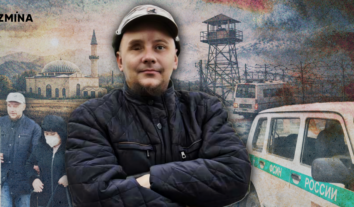Roma in a Vicious Circle of Fear and Discrimination
Normal
0
false
false
false
RU
X-NONE
X-NONE
/* Style Definitions */
table.MsoNormalTable
{mso-style-name:”Обычная таблица”;
mso-tstyle-rowband-size:0;
mso-tstyle-colband-size:0;
mso-style-noshow:yes;
mso-style-priority:99;
mso-style-qformat:yes;
mso-style-parent:””;
mso-padding-alt:0cm 5.4pt 0cm 5.4pt;
mso-para-margin-top:0cm;
mso-para-margin-right:0cm;
mso-para-margin-bottom:10.0pt;
mso-para-margin-left:0cm;
line-height:115%;
mso-pagination:widow-orphan;
font-size:11.0pt;
font-family:”Calibri”,”sans-serif”;
mso-ascii-font-family:Calibri;
mso-ascii-theme-font:minor-latin;
mso-fareast-font-family:”Times New Roman”;
mso-fareast-theme-font:minor-fareast;
mso-hansi-font-family:Calibri;
mso-hansi-theme-font:minor-latin;}
Run away from the shots and the eternal fear. Live in a forest, a train station, on the outskirts. Fight poverty for a piece of bread. Then be met with double discrimination in the “safe” area, for being an IDP and for being a Roma.
According to a monitoring mission of the International Roma Women Charitable Fund Chiricli, about 9,000 Roma have been forced to flee their homes in the east of Ukraine and have had to move to other regions. But there, where they arrived, fleeing from war, they were faced with fear and often hostility of local communities.
“The local population was not prepared to see this number of Roma families. This has caused fear and reinforced negative stereotypes that existed before,” explains Chiricli vice-president Zemfira Kondur.
According to monitoring data, about 5,000 Roma were not registered as internally displaced persons. The reasons are different, such as the absence of documents, the absence of permanent residence stamp in their passports (this was the case for 2.5 thousand Roma from the east of Ukraine). Additionally, people were afraid of being detained by law enforcement agencies due to lack of documents.
Even those who had documents were afraid to register, so that later, when they return home, they could possibly avoid harassment or ill-treatment.
Over 55% of Roma are not registered as internally displaced persons due to the fear of confiscation of their property by the police or other authorities.
About 1.5 thousand people were not given any information about where they could register or how to get any aid.
“Roma cannot get a job or rent a house, not only because they are displaced, but also because they are Roma. Many of them lack proper education or work experience. Many of the children did not go to school because their parents were told that schools were overcrowded. 130 Roma women said that they could not re-register documents for social aid. This was nearly the only opportunity they had to get at least some money. I know families who are receiving social assistance and rent a house, but they have no money to buy food or medicine for children,” says Kondur.
To avoid discrimination, some Roma do not even admit their origin.
Last August, the leader of the Roma community of Uzhhorod, a journalist named Miroslav Horvat, said on his Facebook page that the local Roma joined a voluntary collection of funds for soldiers from the Zakarpattia region who are fighting in the ATO.
“I am glad that the Roma of the city supported this idea – everyone who wants to and has the opportunity to do so may help us. We walked a few of the ‘Roma streets’ of Uzhhorod and collected the first donations. Everyone was chipping in for the army, from children to the elderly,” said Horvat.
Displaced Roma are most often discriminated against in finding housing and employment, says the head of the public organization Chachimo, Mykola Burlutskiy.
“There was a situation when housing was provided for the Roma community in Kharkiv who had moved from Sloviansk. It was in an old clinic which has been abandoned for 10-15 years. The building has no windows or doors. Absolutely everything is destroyed. Even families with infants were given this housing without electricity or water. When we asked why this was what the Roma were given, all we got was being told ‘You can repair it yourself,’” says Burlutskiy.
A similar incident happened when one of the Kharkiv hotels that provided temporary shelter for mothers with young children denied their services to Roma mothers. Only the intervention of Roma communities and volunteer organizations resolved the issue.
There is a similar situation with employment. Sometimes, even the Roma who have a profession and qualifications have been denied work when employers saw that they were Roma.
The monitoring mission also documented cases when money was demanded from a Roma family from the Kharkiv and they were threatened with being sent back to Donbass.
Some families had to come back, without having any support or opportunities to get something. But, upon returning home, it did not become easier. For example, in Sverdlovsk in Luhansk region, where some Roma families returned to, there is no water, no bread, no money. Humanitarian aid does not reach small towns like this.
There have been cases of violence on the part of local populations. Burlutskiy remembered how once a window of Roma family’s home in Sloviansk was broken with the assailants throwing firecrackers while shouting “Get out of here, gypsies!”
It is vicious circle of fear.
To break it, we need to overcome the severe illiteracy of the Roma (about 60% of the respondents do not have a primary education and do not know how to write or read), and break down stereotypes and prejudices against them.
The first such attempt on the state level took place two years ago, when a Strategy for the Protection and Integration of the Roma National Minority into Ukrainian society was approved.
By adopting this strategy, the leadership of Ukraine acknowledged that the Roma have a problem that must be addressed. But, as of now, the effectiveness of the Strategy’s implementation is low.
The situation pertaining to the rights of the Roma leaves much to be desired. In Ukraine, there is no single body that could duly implement state policy towards Roma, which is outlined in the Strategy for the Protection and Integration of the Roma National Minority into Ukrainian society.
“Formally, all the responsibility is on the Ministry of Culture, but the scope of its authority is much narrower than the range of problems faced by the Roma national community. The needs of the Roma are primarily in relation to access to social services, education, medicine, and legal aid,” says Olga Zhmurko, the Roma Program Director of the International Renaissance Foundation.
Zhmurko explains that, in Ukraine, although there has been created a government commissioner for ethnic policy, creating another institution does not address the question systematically. It does not change the approach of the state to vulnerable groups, which include the Roma minority.
Meanwhile, Roma communities call on the authorities to at least simplify the procedure for obtaining identity documents for Roma IDPs and to monitor the needs of the Roma population while cooperating more closely with the Roma organizations. Will the government listen?















